Beat of Hawaii is in London during the coronation week spectacle. For this historic event, we traded the tropical Hawaiian Islands for the cooler British Isles. It has been, to say the least, an enormous happening of unprecedented proportions, including the thunderous flyover below, among other things.


The coronation of King Charles also brought to mind the significant connection Britain has had with Hawaii. From the Union Jack on the Hawaii state flag to its first European contact with British explorer Captain James Cook and 100 square feet of British soil on the Big Island. How did that all come to be?
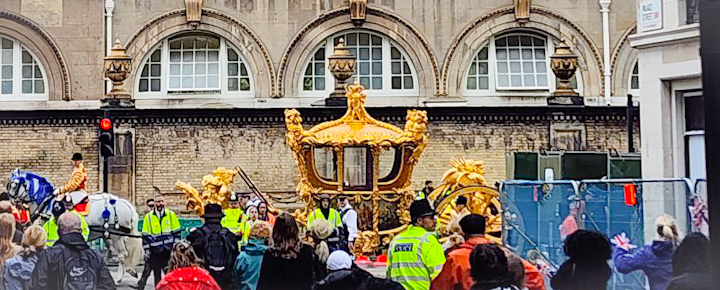

Captain James Cook in Hawaii.
Cook is believed to have been the first from the European region to arrive in Hawaii. The islands were referred to in Britain as the Sandwich Islands in honor of Cook’s sponsor, which name we occasionally still hear to this day. It was named for the 4th Earl of Sandwich, the 1st Lord of the British Admiralty.
There was political conflict at the time between Britain, France, and Russia regarding control in the Pacific. Britain may have hoped to control Hawaii and thus exploit the sugar growing and exporting potential from the islands. Nonetheless, Britain was in some control of Hawaii in the mid-1790s, even as the monarchy remained in place.
British Empire Base In Hawaii
Hawaii figured prominently when the British Empire was at its peak and built on colonies and trade. The Western world’s British explorers arrived here in 1778, after which Hawaii became vital to the British Empire. The Hawaiian Islands developed into a base of British trade in the Pacific Ocean. It was highly valued, among other reasons, because it was where the all-important sugarcane could be sourced and exported to England.
There may have been a brief British military presence in Hawaii to protect their interests. The Kingdom of Hawaii intended to sign a treaty with Britain in 1843 calling for Hawaii to become a British protectorate. That, however, is historically vague. Britain would have defended Hawaii in exchange for receiving preferred trade arrangements. Brits also were allowed to work and live in Hawaii.
The story of Hawaii’s flag and British Hawaii.
The flag of Britain was flown by King Kamehameha I until 1812, at which time a new flag was commissioned by him. The Union Jack representing Britain is to this day emblazoned on its upper left corner, and the flag’s body is comprised of the U.S. flag’s stripes. Kamehameha wanted to include the Union Jack to reflect the power of Britain in its relationship with Hawaii.
Hawaii was welcoming to British entrepreneurs, including those involved in the sugar plantations. There was a time when Britain unofficially occupied Hawaii. Referred to as the Paulet Affair, and sometimes also called British Hawaii. That took place in 1843.
Hawaii never became a colony of Britain, although a brief compact was signed or intended. Hawaii also became recognized by Britain as an independent nation in 1843. Hawaii wished to avoid being colonized; it nonetheless wanted the help and guidance of Britain and other European countries.
You can still visit Britain in Hawaii today.
A large stone monument on the Big Island was deeded to the United Kingdom in 1877. It marks the approximate location of Cook’s death. The 27-foot-tall monument is accessible by water at Kealakekua Bay or by a trail, which is steep and about two miles long one-way.
Get Breaking Hawaii Travel News
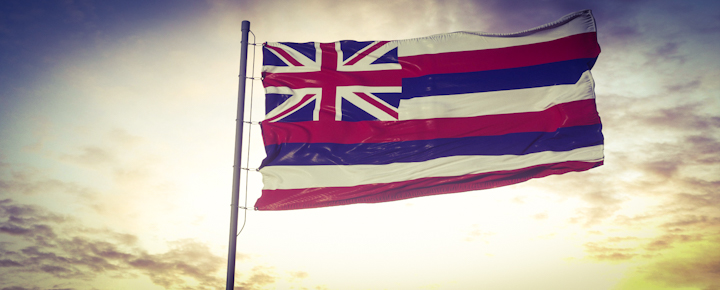

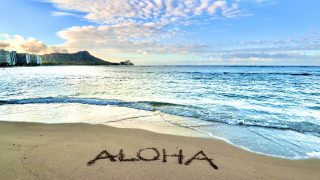
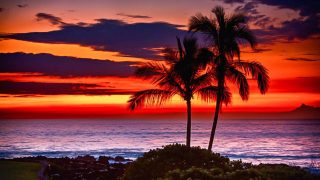
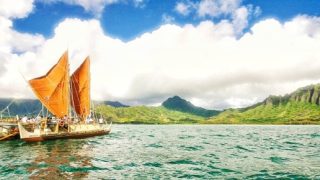
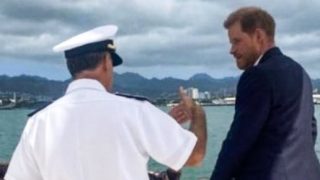
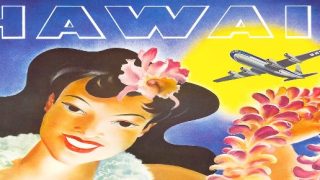
When we think about what might have been, let us not forget the Russians who used Hawaii as a base for Whaling and indeed built a Fort on Kauai. Whilst the coup organized by US businessmen to dethrone the monarchy was hardly in the democratic traditions of the USA, we should not forget that if the US had not interfered with Hawaiian Government the Russians certainly would have done. Worse than that, without the presence of the US fleet at Pearl Harbor there can be no doubt that the Imperial Japanese would have invaded Hawaii as a forward base and treated the locals much as they did in the other Pacific countries they occupied in the lead up to and during WW2.
Good perspective, Rich and I totally agree …I wouldn’t be living on Maui if the Russians were in power in Hawaii!
In the big picture 1959 is not that long ago. Only 140k voters and 93% in favor of state hood. What would that be today and could Hawaii survive without US millions funding. Last election a certain Senator ran on how many millions he brought home.
There was a movement in the 70’s started by a poet that changed all that. Her mantras of “Hawaii was stolen” and “I am not an American, and will never be an American” were spread throughout the islands. The sentiment is growing, and you hear those mantras often if you live here. She made a huge impact.
Reminds me of one of the Trask sisters.
BIG talker. I think it was the tenured professor—at UH-Manoa. She Loved to refer to “western civilization” this and “capitalist culture” that—all the while drawing her nice, juicy salary and accruing [“cha-ching!”] more and more “Benjamins” in her ERS [Employee Retirement System] account.
She did VERY well—Talking about “Hawaii was stolen.”
Hawaii is probably the only US State that’s comfortable with monarchies. Most Americans are raised to believe monarchies are bad, but Hawaii loves, sings about, and even mourns the passing of monarchs/the ali’i class rulers.
People of Hawaii have a love for former rulers that would make Americans uncomfortable–there’s no loving nostalgic songs about Washington or Lincoln as rulers like there are for the Ali’i.
Watching all the pageantry of Charles III coronation makes the coronation pavilion and Iolani palace make sense, for that time. No wonder Americans feel like they’re in a foreign country when they’re here…
Adroit. Cogent. Insightful.
Comments like yours are welcome.
I should have given better directions to that historical marker , walk out of the front door of Lahaina shores condominium , walk out to street , that’s front street in Lahaina. Turn right ( opposite direction of downtown) and walk down the street. Look on the right side of street ( ocean side of street and about 200 feet or so of walking you will see a stone wall , the historical marker is small .
An interesting part of the British influence in hawaii is the decision in December of 1837 to make Catholicism illegal , then in 1839 a French warship notified the Hawaiian monarchy that the ship would use their canons to fire upon Honolulu if this prohibition of Catholicism was not reversed . If you are in Lahaina go to the Lahaina shores condominiums , walk out to the street . Then walk down the street about a few hundred feet and on a stone wall on your right you will see a monument that says on January 24 , 1842 fr. Maigret said the first Catholic mass on Maui at this spot after Catholicism was made legal again. Interesting history especially with the Catholic Church helping the lepers in hawaii . The monument is still there.
Alas the secular politics of the matter cloud the religious context. Let us not forget Washington, Jefferson and Franklin were all Catholics and Freemasons, which in itself was problematic to Rome. One of the things I really enjoy about Hawaii is the presence of strong Christian faith and beliefs in so many Hawaiians.
Did you mean to say they were “anti Catholic and Freemasons “ ?
No the Brits welcomed Freemasons and a lot of the advances made in Britain were down to the fostering of scientific method and reason which was very much a root of freemasonry. It was all down to politics though. The British Bill of rights which formed a starting point for the US one was all about suppressing Catholic plots. All very sad. As so often in history the only winners are students of history who learn what mistakes not to repeat.
Washington, Jefferson and Franklin were deists, not Catholic nor any kind of Christian, believing God did not have a hand in everyday human life.
But yes Christian history in Hawaii is significant, from protestant missionaries establishing schools, real estate deals, and economic institutions, to catholic priests and nuns choosing permanent quarantine to care for virus-stricken citizens exiled with Hansen’s disease.
Tim is quite correct. If you want to see how The British of the time treated their “possessions” (however illegally gained), look no further than Ireland and especially The Six Counties of Northern Ireland. Yes, Catholicism was outlawed and All were required to pay tithes to the Anglican protestant church (or its offshoots).
We are indeed very fortunate to have escaped British rule.
Not sure it was a good thing that Hawaii became a US State, but I am certainly glad it did not become yet another colony of Great Britain.
Could not agree with you more about Hawaii not becoming a colony of Great Britain. I do however, believe that the Kanaka Maoli’s might have a slightly different view regarding this article. But we are always very appreciative of BOH’s wonderfully informative reads!!
“ Hawaii wished to avoid being colonized; it nonetheless wanted the help and guidance of Britain and other European countries.”
Just like now.
I never heard anyone in Hawaii asking for help from Britain or other European countries …what exactly would they be asking for?
probably more pineapple and poke
Erek,
You make the most kind and intellectual of replies. Thank you for noting the comment policy.
Kind regards
Yes. Another reason why I visit this site.
Appreciative souls like you are another reason.
Analogy relates to current Hawaii->US relations.
Eva B,
Well, it may be that they would not be asking for anything. But, if they were, maybe for homelessness to be solved, for a start. Respect for the indigenous population would probably go a long way 2.
Furthermore:
– Investment into local businesses.
– More charity.
– More community centres.
*Stuff like the above.
Kind regards
The Hawaiian Monarchy were keen to emulated the institutions, rule of law etc that Britain had developed as it tried to modernize the Nation. That said the single biggest card that Britain had to play was the role of the British Royal Navy which still ruled the waves at that time and for a nation in the middle of the Pacific having the support of the the British Royal Navy then would be like having the resources of the USNavy as in Pearl Harbor and the other US military resources across the Islands today.
You are On the money, Rich!
Precisely, rich. It would or would not be a shame if the paradigm relating to the presence of the United States of America / the United States of Mainland America, in the form of “the USNavy… in Pearl Harbo[u]r and the other US military resources across the Islands today”, ceased to exist.
Toodle pip,
Andrew
P.S. I recommend that you listen to: New Order – Krystal
“Would or would not be a shame”….well, that about covers the options, I would say!😂